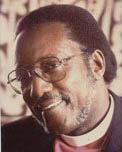Classic DACB Collection
All articles created or submitted in the first twenty years of the project, from 1995 to 2015.Kivengere, Festo (A)

Festo Kivengere, “the Billy Graham of Africa,” was a Ugandan Christian leader who faced the wrath of the brutal dictator Idi Amin. Unlike Janni Luwum, who had been killed by Amin, Kivengere and his family fled the country. He returned after Amin’s downfall to continue an active ministry until his death by leukemia in 1988.
Born in 1919 in a rural setting among the semi-nomadic rural pastoralists of southwest Uganda, Festo Kivengere belonged to a pagan ruling family. He spent his early life as a cattle herder, where he would read children’s books about Jesus while herding calves. At about age ten he joined a mission school established in his village and was eventually sent away for higher education, after which he returned to his village as a teacher. Converted to Christianity during a revival meeting, Kivengere became a pastor and eventually Anglican bishop of Kigezi. After study in England and a trip to Australia he was asked to translate into Swahili the sermons of the American evangelist Billy Graham, who developed such confidence in Kivengere that he told him, “Don’t bother to translate literally. You know what I mean, get that across.” Kivengere and Graham became lifelong friends. The young African evangelist shared the platform with Graham on American revival tours and eventually formed his own African Evangelic Enterprise.
His own growth in the church coincided with the increasing excesses of the ruler who has been called “Africa’s Hitler,” and Kivengere was forced to flee his country. But he was not bitter because of the experience. He wrote a book called I Love Idi Amin in which he wrote, “On the cross, Jesus said, ‘Father, forgive them, because they don’t know what they are doing.’ As evil as Idi Amin was, how can I do less toward him?”
Kivengere had met with Idi Amin to voice his opposition to the killing in 1973 of three men from his diocese by a government firing squad on a trumped-up charge:
February 10 began as a sad day for us in Kabale. People were commanded to come to the stadium and witness the execution. Death permeated the atmosphere. A silent crowd of about three thousand was there ready to watch. I had permission from the authorities to speak to the men before they died, and two of my fellow ministers were with me. They brought the men in a truck and unloaded them. They were handcuffed and their feet were chained. The firing squad stood at attention. As we walked into the center of the stadium, I was wondering what to say. How do you give the Gospel to doomed men who are probably seething with rage?
We approached them from behind, and as they turned to look at us, what a sight! Their faces were all alight with an unmistakable glow and radiance. Before we could say anything, one of them burst out: “Bishop, thank you for coming! I wanted to tell you. The day I was arrested, in my prison cell, I asked the Lord Jesus to come into my heart. He came in and forgave me all my sins! Heaven is now open, and there is nothing between me and my God! Please tell my wife and children that I am going to be with Jesus. Ask them to accept him into their lives as I did.” The other two men told similar stories, excitedly raising their hands, which rattled their handcuffs.
I felt that what I needed to do was to talk to the soldiers, not to the condemned. So I translated what the men had said into a language the soldiers understood. The military men were standing there with guns cocked and bewilderment on their faces. They were so dumbfounded that they forgot to put the hoods over the men’s faces! The three faced the firing squad standing close together. They looked toward the people and began to wave, handcuffs and all. The people waved back. Then shots were fired, and the three were with Jesus.
Forgiveness, reconciliation, and proclamation were the three cornerstones of Kivengere’s ministry, which continued until his death. Uganda, the country with perhaps the largest number of martyrs per square kilometer in Africa, also has one of the densest populations of active witnessing Christians.[1]
Almighty God, ruler of all nations, we give you thanks for the steadfast witness of your servant Festo Kivengere. Through his life we learn of your enduring presence among us; through his death we know that pain and fear are left behind at the gate of your eternal kingdom, where dwell the blessed dead in life everlasting, with Jesus Christ our Savior. Amen.
Frederick Quinn
Notes:
- www.wbaptist.com/fsi/kerux/990829-sermon.htm
This article is reproduced, with permission, from African Saints: Saints, Martyrs, and Holy People from the Continent of Africa, copyright © 2002 by Frederick Quinn, Crossroads Publishing Company, New York, New York. All rights reserved.



